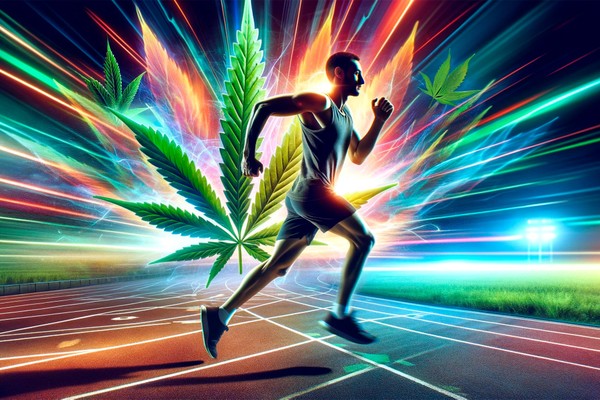
Can Cannabis (THC) Boost Your Performance? And Possibly Even Boost Your Recovery? Cannabis Effects on ATP & Mitochondrial Function.
We dug a little deeper into the long-standing "taboo" debate between athletes of weather cannabis can or cannot improve performance and recovery.
There's not much clinical research on this controversial topic, and up until now, it's been word against word (self conducted subjective n=1 studies) on weather or not cannabis actually increase performance and recovery. So who is right?
Can cannabis actually improve your performance and recovery?
The answer...
Based on the provided research results we found, it appears that the answer to this question is complex and multifaceted.
However, cannabis COULD increase performance and recovery in a quite surprising way! This is all due to THC's effect (the psychoactive compound) on your mitochondria. Mitochondria are essential the key power houses of your cells and are essentially bacteria floating around inside our bodies that allow us, and give us, the energy to live! Yes, it is a bit creepy and fascinating! We need to prioritize taking care of these special mitochondrial friends of ours because they are essential to our existence and are essentially a massive part about what make us human and allow our muscles and bodies to do what we ask of them to do.
See more about what mitochondria are and how to keep them healthy for optimal ATP production and longevity, performance and recovery in the Dr. Cohen's MLP formulary. Do not miss out on this!
Now back to the studies...
According to research in one study, THC’s effects on ATP production are dose-dependent: THC, as well as the safer non-psychoactive, high antioxidant CBD oil, can both increase mitochondrial activity and ATP production in smaller doses by interacting with the mitochondrial membrane and promoting the creation of ATP. This process also aids in cell regeneration by triggering autophagy, which repairs damaged cell parts. In this study, they also found that higher doses of THC can decrease mitochondrial activity by binding to CB1 receptors, leading to decreased oxidative stress. In other words, by taking cannabis you can boost your performance and recovery though extra ATP production. However, let's not get too excited, they did not share what doses and there's a catch here...
THC Mitochondrial dysfunction and ATP production: Another study suggests that THC can, on the other hand, induce brain mitochondrial respiratory chain dysfunction and increase oxidative stress, which may lead to low ATP production and neuronal damage. So, in reality, the results are unclear and more studies direct on the cannabis plant's effect on ATP product need to be done for a final answer.
Comparison to ginseng and other superfoods: In contrast, ginseng and other superfoods have been shown to even better increase ATP production in mitochondria by activating enzymes in the tricarboxylic acid cycle, enabling mitochondria to extract maximum energy from glucose fuel in the presence of oxygen. Look more into beet juice powder, CoQ10, healthy fats and oils, coffee, herbal mushrooms and high protein diets to boost your ATP further, better, and safer!
You can also choose to take the direct and most clinically-proven way to boost performance and recovery by taking, well, our ATP pill (we highly recommend this combo for super energy, recovery and pre-workout in 30 minutes UNBEETABREW + PEAK ATP)!
In summary, the answer to whether cannabis increases ATP production is dependent on the dose and specific effects of THC on mitochondrial activity and still unclear. While smaller doses may increase ATP production, higher doses may have the opposite effect. Mitochondria are massively important for healing, energy, strength, neural function, and general health. But, even then, the research still holds quite a large grey area.
So, let's take the PureClean Performance clinically-proven route, instead, and choose UNBEETABREW + PEAK ATP (with beet juice, coffee, and herbal mushrooms), or any other one of our doctor-made formulas also clinically-proven to boost your energy, performance and recovery!
To your best health!
BONUS STUDIES: Clinical Studies of Cannabis and Mitochondrial Disease Treatment
A variety of clinical studies have been performed to examine the effects of cannabinoids on mitochondrial activity. Research suggests that cannabinoids interact with mitochondria in a way that improves and regulates their function. These studies provide support for medical marijuana as a valid treatment option for mitochondrial diseases.
A 2012 study published in Philosophical Transactions of the Royal Society B: Biological Sciences concluded that the endocannabinoid system has a multiphasic interaction with mitochondria and modulates mitochondrial function through multiple pathways. Endocannabinoids in the body can interact with mitochondria to both restore and destroy cells, depending on oxidative stress levels. That suggests the potential for THC and other cannabinoids to regulate mitochondrial function. A 2007 study published in Biochemical and Biophysical Research Communications, demonstrated similar effects of THC and two other cannabinoids to alter mitochondrial function.
A 2014 study in the American Journal of Physiology demonstrated stimulation of the endocannabinoid system could improve cellular respiration by interacting with mitochondria, which suggests the benefit of treatments for mitochondrial diseases that target the endocannabinoid system.
A 2012 study on aging showed cannabinoid interaction with mitochondria could suppress neuroinflammatory processes that contribute to aging and slow neurodegeneration. It improves motor and cognitive impairment that result from neurodegenerative diseases, as well as slowing natural cognitive decline. This study also echoed the consensus that cannabinoids can regulate mitochondrial activity to preserve homeostasis in cells.
